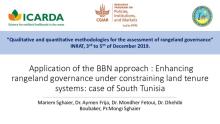/ library resources
Showing items 1 through 9 of 12.Rangeland management in former tropical rainforest areas may affect ecosystem services.
PIM support to work from ILRI and partners contributed to adoption of a woreda (district) participatory land use planning approach in Ethiopia and to expansion of the joint village land use planning approach in Tanzania, resulting in more secure tenure rights for pastoralists in rangeland areas.
The presentation discusses the application of the Bayesian Belief Network (BBN) approach to enhance rangeland governance under constraining land tenure systems in the South of Tunisia.
Within discussions of land and resource rights, there is growing attention to women’s rights, mostly in terms of household and individual rights to private property.
Rangelands can be described as land on which the vegetation
is predominantly grasses, grass-like plants, forbs or shrubs,
and often with trees that are grazed or have the potential to be
grazed by livestock and wildlife. They are diverse in their vegetation
Climate change threatens the ability of global rangelands to provide food, support livelihoods and deliver important ecosystems services. The extent and magnitude of potential impacts are however poorly understood.
Since 2017, ICARDA has been facilitating the transition to improved policies for sustainable management of rangelands in Tunisia.
The pastoral code aims at achieving a more sustainable management of Tunisia's rangelands. The draft code was informed by ICARDA's research on assessment of rangelands governance under PIM.
Paginação
Land Library Search
Through our robust search engine, you can search for any item of the over 73,000 highly curated resources in the Land Library.
If you would like to find an overview of what is possible, feel free to peruse the Search Guide.




